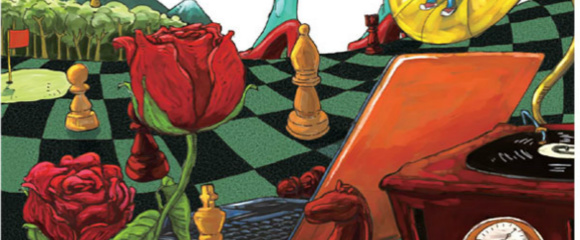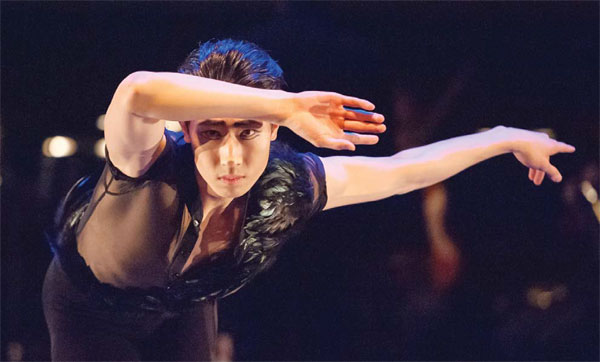Accidental ballet star on the rise
Updated: 2016-03-18 08:42
By Cecily Liu(China Daily Europe)
|
|||||||||
|
|
A Chinese-born dancer took ballet when another class was filled, and he learned his life's goal from another unexpected turn of events
That Zhang Jinhao finds himself on stage, living out his love of ballet, is one of the little wonders of life.
He performs from the heart, and clearly this is his life's work.
"It's about feeling the details of every gesture, feeling the emotions and personality of the character I dance, and trying to understand what he is like and what he is trying to communicate," says the 20-year-old rising star of the English National Ballet.
Zhang, who started studying ballet at the age of 4, has won international acclaim, including winning the English National Ballet's emerging dancer competition last year.
He grew up in Dalian, Liaoning province, and started starting ballet by accident. "When I was young, I was very thin and did not eat meals properly, so my mother wanted me to do more exercise. She took me to enroll in a kung fu class, but sadly the class was filled."
The teacher in charge of registration told Zhang's mother that the difference between kung fu and ballet is small, and urged Zhang to try ballet instead.
He joined the English National Ballet in 2014. On stage, he wins his audience over with the perfection of his technique and his ability to create true and believable characters, be it a wealthy boss, a loyal servant or a beautiful swan.
In conversation, his youthful liveliness and passion for the profession shows through strongly, while his 185 centimeter, muscular body commands respect.
Sitting down for an interview in a small office above his rehearsal studio, he elegantly moves his head, hands and feet in the air to demonstrate how concepts like love, promise and suicide are acted out in ballet. Suddenly, these soundless movements seem to vividly describe what writers have attempted to convey for generations.
A favorite role is Basilio in Don Quixote, which is a ballet originally choreographed in 1869, based on episodes taken from the famous Spanish novel Don Quixote de la Mancha by Miguel de Cervantes.
When competing in Prix de Lausanne in 2013, Zhang performed the passionate dance of a proud Basilio as he is about to get married. The fast-moving excerpt, lasting for just over a minute on stage, consists of jumps and turns, and paints a cheerful and lively picture representative of Spanish culture. Zhang has loved this dance since high school and prefers the technical and artistic challenges required of the Basilio character, who is more of a free spirit.
Despite years of practice, Zhang felt nervous when he competed in Prix de Lausanne, which turned out to be a life-changing opportunity for him when he won a scholarship to study at the English National Ballet School as a result. In addition to the importance of the competition was the technical challenge of the 3.5 degree stage slope.
"I was so, so nervous," Zhang recalls. "I knew that many dancers actually fell when they landed on their tiptoes after a jump because of this slope, so I dared not to think about the slope when I was on stage."
To overcome this fear, he instead forced himself to forget about the stage, to focus on Basilio's joyful feelings in that particular marriage, to think about Basilio's beautiful bride, and to enjoy himself. "I did it, and I didn't make a single mistake."
Zhang fell in love with ballet immediately when he tried it, and he recollects his childhood encounter with ballet with fondness. "I was the only boy in a class full of girls, and they teased me about it. On the one hand I was embarrassed, but at the same time I enjoyed the attention for being able to stand out."
After four years, it was time for Zhang to choose the path of becoming a professional ballet dancer. "I chose it. But at the age of 8, I did not know what being a professional ballet dancer meant at all," he says.
As a professional dancer, Zhang joined the school affiliated with the Liaoning Ballet, where he trained for six years before starting his undergraduate degree in ballet at Shanghai Tongji University.
The glamorous milestones of Zhang's ballet career came one after other, but one big disappointment taught Zhang how much he really loves ballet.
In 2013, right after his success at the Prix de Lausanne, he continued to train for another international competition in Moscow. "I was not taking any rest, and pushed my body to the extreme of what it could bear. I was tired and didn't look after myself properly."
Zhang had never had a problem with discipline and just kept pushing himself. Just before the competition, he landed on the back of his foot in a jump during a rehearsal and fractured a bone.
For the next four months, Zhang lay on a bed unable to move his foot. "I was disappointed and frustrated. I was scared that I may not be able to dance again after the plaster was taken off."
Those days were the darkest in his memory, where he experienced intense grief and self-doubt. Then came his epiphany. "I realized that I could not live without ballet. I never knew how much I loved ballet until then."
Zhang is now working toward his next goal, which is to eventually perform lead roles at the English National Ballet. "Every performance is a new challenge because I have to do my best to give the audience the best experience."
cecily.liu@mail.chinadailyuk.com
Today's Top News
Paris attacks suspect wounded in Brussels shootout
China's latest GDP target is attainable: OECD Chief
What makes the middle class tick
One-stop app
EU to pitch migrant plan to Turkey
DPRK fires medium-range ballistic missile
Virgin Atlantic investigates abuse case
as story goes viral
Shanghai firm is latest Chinese investment in UK soccer business
Hot Topics
Lunar probe , China growth forecasts, Emission rules get tougher, China seen through 'colored lens', International board,
Editor's Picks

|

|

|

|

|

|







